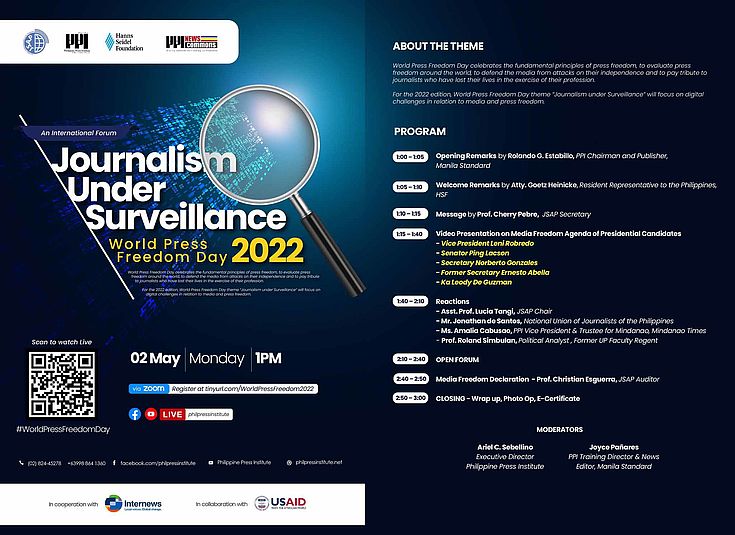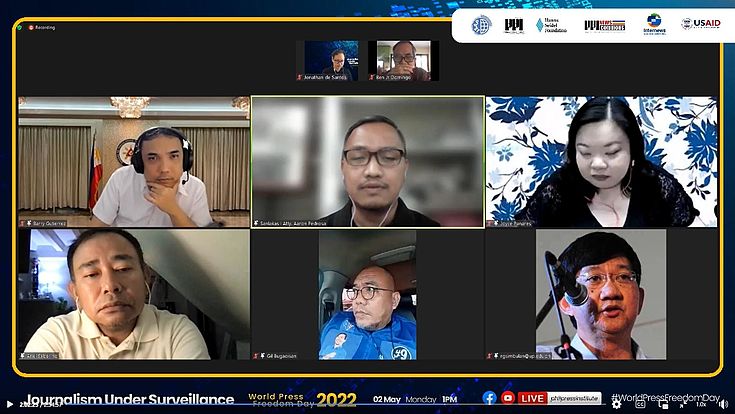World Press Freedom Day Forum
Forum discusses Philippine press freedom and presidential candidates’ views
“How will you protect media freedom should you win the elections?” was the question presidential candidates for the Philippines’ May 9, 2022 general elections were invited to respond to in verbalizing their sentiments on the topic in “World Press Freedom Day 2022 Forum: Journalism under Surveillance” held on 02 May 2022. Media organization representatives and analysts drew attention to the relevance of this annual occasion observed by countries across the globe in relation to the media and information policies of the incoming administration that will be chosen to lead the country in the coming elections. This online forum was organised by the Philippine Press Institute (PPI), in collaboration with the Journalism Studies Association of the Philippines (JSAP) and the National Union of Journalists of the Philippines (NUJP).
PPI
In celebration of World Press Freedom Day, the activity was held to serve as an occasion to focus on digital challenges in relation to media and press freedom and to pay tribute to journalists who have lost their lives in their profession. With the elections right around the corner, it was observed to be an opportune time for the journalism community to steer discussions on media freedom and the policies of the next government on the matter. The forum was concluded with the reading of the Media Freedom Declaration issued by civil society comprising media organisations and concerned individuals.
The PPI invited the top ten presidential candidates of the upcoming elections and sought their sentiments on the protection of media freedom. One of the candidates personally joined the online discussion to voice his sentiments while four others responded through the provision of a recorded video message in which they expressed their support for media freedom, freedom of information and transparency. The candidates’ messages provided insights as to where media freedom stands with them and how they might formulate policies therefor in the event that they should be elected to the highest post in the country. There was a general expressed gratitude for the opportunity to share their considerations and the opportunity to be part of World Press Freedom Day celebration.
World Press Freedom Day was proclaimed by the United Nations General Assembly in 1993. It followed a Recommendation adopted in the twenty-sixth session of United Nations Educational, Scientific and Cultural Organization's (UNESCO) General Conference in 1991. The adoption was said to have been carried out as a response to a call by African journalists who in 1991 produced the landmark Windhoek Declaration on promoting Independent and pluralistic media.
Hence, is has been observed by countries across the globe on 03 May as “a date which celebrates the fundamental principles of press freedom, to evaluate press freedom around the world, to defend the media from attacks on their independence and to pay tribute to journalists who have lost their lives in the exercise of their profession.”
HSF
The reactors noted the positive aspects from the responses given by the presidential candidates in the context of the current state of press freedom in the country. They expressed hopes for the development, with the new administration, of an environment where media has access to information, are safe to cover news and can be truly independent from political and economic pressure. Media freedom, media pluralism, media independence and decent work were the four criteria one of the reactors used in assessing the media freedom agenda of the candidates.
Another linked the struggle for freedom of expression and of the press to the struggle for democracy and expressed preference towards looking at the track records and actions of the candidates in so far as how they have contributed to the struggle for the restoration of democracy to analyzing their commitment based on their recorded statements. Altogether, it could be noted that they saw room for an even clearer commitment to support press freedom, such as promotion of freedom of information, protection of media workers from harassment and censorship or “use of government processes or regulatory powers to silence media.”
Overall, the exchanges acknowledged, on one hand, the importance of an active citizenry, as manifested by an engaged social media community; and, on the other hand, drew attention to the set of ethical and legal standards and the accountability media practitioners are bound to for ensuring the truthfulness of content published and highlighted the value of transparency to help strengthen the credibility of the country’s media.
This activity is amongst several regular discussion and information sessions organised by the Philippine Press Institute, with support from the Hanns Seidel Foundation (HSF) as part of their project cooperation on civic journalism since 2017.


